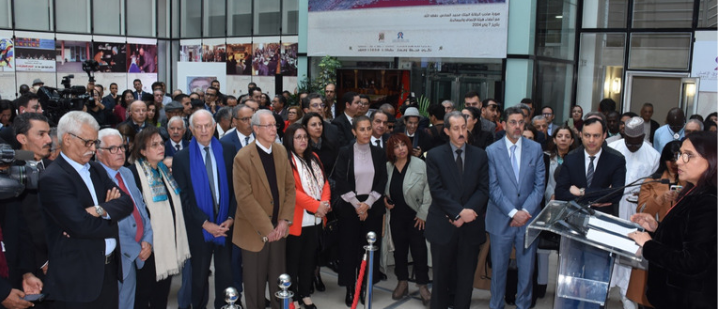Ms. Bouayach kicks off the Commemoration of the 20th Anniversary of the Equity and Reconciliation Commission

In her opening statement Ms. Amina Bouayach, Chairperson of the National Human Rights Council (CNDH), welcomed participants to the human rights celebration, through which several activities will be launched and continue throughout this year to commemorate the 20th anniversary of the establishment of the Equity and Reconciliation Commission (IER) in January 2004, as a milestone and a process. IER was a turning point, a foundation of democratic transition and consolidation of the Rule of Law and institutions.
The celebration was held on Friday 26 January 2024 at the CNDH headquarters in Rabat, Morocco.
Several human rights and political activists who have played a pivotal role in shaping the human rights landscape in Morocco participated in this event. Ambassadors and representatives from international bodies in Morocco, as well as family members of the victims and rights holders also took part in this ceremony.
Ms. Bouayach stressed that this process did not end with the constitutionalization of these recommendations. She also emphasized the process of transitional justice in Morocco through a photo exhibition organized at the CNDH, showcasing the IER evolution and the implementation of its recommendations. The journey began with the idea of establishing the IER and submission of this recommendation to His Majesty in 2003, followed by hearing sessions and the IER’s work. It continued with the reception of families, the issuance of decisions for victims and rights holders, rehabilitation of places of memory, and the archiving and preservation of transitional justice in Morocco.
Ms. Bouayach highlighted that this distinctive and unprecedented experience within the regional context embodied a collective will aiming at rebuilding the civil society and political parties based on new foundations. She also noted that the more profound the Moroccan experience is, with repercussions extending beyond national geographical and cultural borders, the more convincing it is as an effective best practice.
CNDH Chairperson noted that the success of the Moroccan model in uncovering the truth, providing reparation, resolving situations, and preserving collective memory, was made possible through the genuine commitment and considerable engagement of various partners. These partners include the Head of government, Ministry of the Interior, Ministry of Justice, Civil Service, judiciary, national security, Royal Gendarmerie, Office Chérifien des Phosphates Foundation, Deposit and Management Fund, and international collaborators.

Mr. Mohamed Dkhissi, Central Director of the Judicial Police, stressed that the General Directorate of National Security (DGSN) has been collaborating with the IER since its establishment as well as the Advisory Council on Human Rights (CCDH), in accordance with the instructions of His Majesty King Mohammed VI. The DGSN is also currently collaborating with the CNDH, making the central and regional archives available to the CNDH, and aligning with major projects emanating from the IER’s recommendations.
Within this context, he noted the partnership agreement between the CNDH and DGSN, including the development and implementation of an action plan to enhance the capacities of DGSN officials in collaboration with various national governance institutions. This inevitably fortifies Morocco’s position in its interaction with United Nations Human Rights Mechanisms, mainly the United Nations High Commissioner for Human Rights. The latter has organized several international and regional meetings in partnership with the DGSN and relevant government sectors.
In reference to her experience within the IER, and being the only woman IER member, Mrs. Latifa Jbabdi affirmed in her statement that all entities, whether as a society, a State, a human rights movement, victims, or families, have the privilege to be proud of this experience and cherish it. She emphasized that it represents a pivotal moment in Morocco’s contemporary history. She further stated that the IER stands as one of the foremost milestones in human rights, symbolizing the culmination of arduous and protracted efforts within the human rights movement and among the victims and their families.
It also represented the most exemplary manifestation of the alignment between the Royal will and the societal expectations, reflecting the collective aspiration to move beyond a history marked by serious human rights violations. The aim was to establish the pillars of the Rule of Law, promote and protect human rights values, and learn from past experience to prevent the recurrence of painful violations that occurred in the past.
This ceremony, celebrating the 20th anniversary of the IER, featured an exhibition showcasing photos and videos documenting the IER and the Follow-up Committee, which is a significant milestone in the process of achieving equity, justice and structural reforms.






















